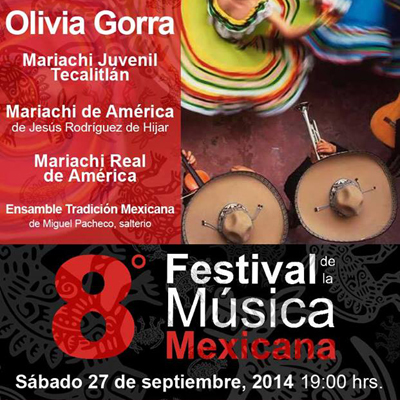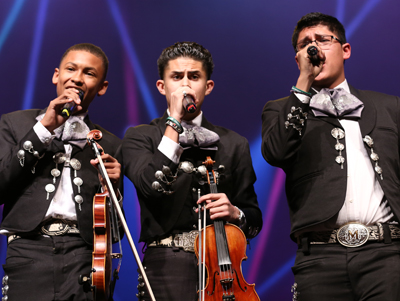- Festival pays homage to Mexico City mariachi pioneers
- Bogotá, Colombia offers mariachi master classes
- 20th annual Mariachi Vargas Extravaganza group competitions
are less than two months away - Term ‘mariachi vocalist’ sparks controversy
Festival pays homage to pioneers
On Saturday, September 27, the Mexico City Musicians’ Union (SUTM) presented its 8th annual Festival of Mexican Music, at that city’s Julio Castillo Theater. Participants include Mariachi Juvenil Tecalitlán, and Mariachi de América de Jesús Rodríguez de Híjar. Operatic soprano Olivia Gorra, who will be debuted her first mariachi CD that day, also performed, accompanied by Mariachi Real de América.
As part of the aforementioned event, SUTM honored six pioneer mariachi musicians who have been active in Plaza Garibaldi and Mexico City for many years: Ramón Camacho “el Gulli,” (violin, Mariachi Perla de Occidente, Mariachi Los Mensajeros, Mariachi ‘70 de Pepe López, and Mariachi 2000 de Cutberto Pérez); José “Pepe” Chávez (guitar, Mariachi Nacional de Arcadio Elías; director, Mariachi Oro y Plata); David Figueroa (vihuela, Mariachi Tolteca de Miguel Martínez; director, Mariachi Blanco y Negro); Fidel Zavala (guitarrón, founding member of Mariachi Atotonilco).
Columbia offers mariachi master classes
Bogotá, Colombia offered its first International Mariachi Master Classes from September 22-24, 2014. The team of master teachers from Mexico City and Guadalajara includes Mario Moreno (vihuela, Mariachi Gama 1000 and other groups), Librado Martínez (guitarrón, Mariachi 2000 de Cutberto Pérez), Oscar Ortega (violin, Mariachi Nuevo Tecalitlán), and Gustavo Moreno (trumpet, Mariachi 2000 de Cutberto Pérez). Check out the Encuentro Internacional de Formación Musical del Mariachi en Colombia Facebook page for more information.
By the way, Mariachi Vargas de Tecalitlán will also be in Bogotá soon, performing at the Royal Center on October 7-8, 2014.
Students from Brackenridge High School compete in 2013 competition
Mariachi Vargas Extravaganza group competitions are less than two months away!
Last year, I attended the 19th Mariachi Vargas Extravaganza group competitions. The energy level in general, and the musical level of most of the groups, was absolutely exhilarating! Over 1000 students participated in the following three categories: Elementary/Middle School, High School, and College/University. Click here for a list of 2013 Mariachi Group Competition Winners.
The 2014 Mariachi Vargas Extravaganza Group Competitions will be held on Friday, Nov. 21, at 5:00 p.m., at San Antonio’s Lila Cockrell Theatre. Deadline for group registration is October 24. Click here to register.
Is there such a thing as a ‘mariachi vocalist’?
For several years now, the Mariachi Vargas Extravaganza has been using the terms mariachi vocalist or mariachi singer in reference to its vocal competitions. On occasion, however, an individual comments that these terms are incorrect or inappropriate. I asked Cynthia Muñoz, producer of the event, why she chose this terminology. Here is her reply:
“What is the English term for ranchera singer? There is none, which is why we use mariachi singer or mariachi vocalist, simply because these are terms the majority of people are able to understand. Many people who don’t speak fluent Spanish can’t relate to the word ranchera without a detailed explanation.”
That justification sounded good to me, but I decided to consult Heriberto Molina “El Cura,” who runs his own Academia Mexicana de Canto near Los Angeles, California, and ask his opinion on the matter. Heriberto is widely considered the most influential vocalist who has ever belonged to a mariachi group. He had the following comments:
“Students often say to me: ‘I sing mariachi,’ or ‘I sing banda,’ or ‘I sing norteño.’ But what does this mean? That they sing songs that are performed by a mariachi, by a banda, or by a conjunto norteño? There’s a lot of ambiguity in those terms, and their meanings aren’t at all clear. So I say to them, ‘Look, those of us who call ourselves mariachis sing songs from the musical genre known as the canción ranchera. Previously, it was called the canción mexicana.’ Well, the traditional term for someone who sings this type of song is ranchera singer, but I definitely think there are contexts where it’s appropriate to use the terms mariachi vocalist or mariachi singer. I was a vocalist with Mariachi Vargas for 30 years, and I think these terms are correct and acceptable.”
I wanted a second opinion, so I asked the same question to Nati Cano of Los Camperos. Here is what he said:
Ranchera music includes all the folk musics of Mexico, and many of those regional ranchera genres have very little to do with the mariachi tradition. On the other hand, a lot of material that mariachis play today cannot be considered música ranchera. Other genres that have nothing to do with Mexican folk music have been imposed on the mariachi just to make money. For these reasons, I’m not at all opposed to the term mariachi vocalist, nor do I consider it incorrect.
So what do you, our readers, think? Please leave your comments below.
—Jonathan Clark









Cantante in Spanish or vocalist in English. Encompassing all genres that mariachis perform.
Although I don’t like the fact that a Spanish word is used in
conjunction with an English word (mariachi singer, mariachi vocalist),
I can’t think of any other way to describe someone who sings songs in
the traditional mariachi genre.
And, as stated above, for someone who doesn’t speak Spanish,
hopefully, they can at least understand that the singer will be
accompanied by a mariachi.
Since at least the 1950s, “mariachi’ has appeared in English-language dictionaries, so it’s a word that was incorporated into this language well over half a century ago.
I don’t see why the word “ranchera” has to be translated.
The US public knows what a “ranch” is; it wouldn’t seem so difficult
to extend that definition to say that they are songs from the ranches.
In agreement with Nati Cano, these folk and popular songs (of the
small towns or ranches from all over Mexico) were never just from the mariachi genre. “Tristes Recuerdos” for a more popular example, is performed by many types of group, from a mariachi to a banda to a norteño group. (I’m sure there’s more!) Same song, different styles. Would you still call the singers in those other ensembles “mariachi singers”?
The traditional ensemble is mariachi, the musician in the ensemble
is a mariachi. The traditional repertory can be mariachi. But the rancheras (which include 2/4, 3/4, slow 4/4, composed huapangos, and bolero amongst
other song forms) are simply rancheras, with a defined style of interpretation for each of the song forms.
The tradition of the cantante ranchero is very different from that
of a mariachi. They are usually a featured soloist, not playing an
instrument with the group. Their uniform (not costume!) is different
from that of the mariachi ensemble. Lucha Reyes was one of the first female
ranchera singers to record. I know current cantantes rancheros, and those
that I’ve asked say they have never considered themselves
“mariachi singers” because they are not mariachis. They are cantantes
rancheros.
I am very pleased to support the change that mariachimusic.com made,
as well as all of Jon Clark’s blogs.
¡Que viva la tradicion del mariachi! ¡Y que viva la tradición de los
cantantes rancheros!
I think it would suffice to simply say “Best Vocalist” competition. If it’s a “mariachi” event, it’s pretty understandable what type of vocal competition it will be. It’s not like a singer would pop up with a hip-hop band! 😉 In my personal taste — which doesn’t mean a hill of beans in the end of it all — I’m of the feeling that it sounds a bit denigrating to call it a “Mariachi Vocalist Competition.” This is about “music” — particularly about “singing.” A singer of any kind of genre is a “vocalist.” The fact that it will be a vocalist singing to music played by a mariachi is due to the fact that it’s a “Vocal Competition” at a “Mariachi Vargas Extravaganza.”
A vocalist is a vocalist is a vocalist. Bobbie McFerrin is a vocalist, and it’s possible that he might one day sing or make his sounds accompanied by a mariachi, but that won’t mean he’s a “mariachi” vocalist. Basically, there’s room for argument in a variety of degrees regarding the title “Best Mariachi Vocalist.”
And so — to save all argument and not hurt and feelings of those that feel strong about it one way or the other — the choice of using simply “Best Vocalist” kills all argument or opinions to it. But that’s just my humble opinion. 😉
Either way, Jonny, keep up the great work. I think it’s great to have healthy and intelligent discussions on these type of subjects in order to develop future leaders and historians for our beloved music.